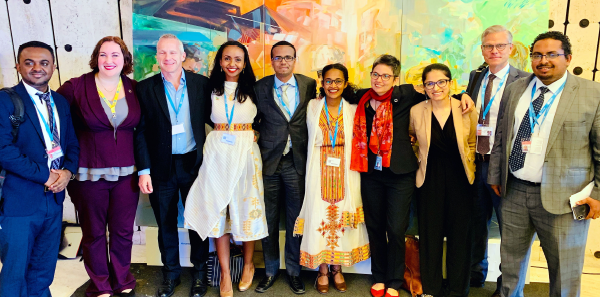
What Does This Mean for International Emergency Medicine?
A WHA resolution is a compelling directive to WHO and its member states. It functions as a mandate to prioritize the resolution’s subject. It is a powerful guide for advocacy for a neglected area such as frontline emergency care.
Explore This Issue
ACEP Now: Vol 38 – No 12 – December 2019Resolution 72.16 has the potential to be incredibly transformative in strengthening health systems globally. If member states and other partners heed the call, it provides an opportunity for coordinated action in a high-impact area, and to raise awareness of the enormous potential contribution of emergency care to a range of related agendas.
Resolution 72.16 specifically urges member states to promote emergency care as a pillar of UHC. It asks the member states to incorporate dedicated, equipped prehospital and hospital emergency unit care into their health strategies and to integrate facility-based and prehospital care systems. It also urges member states to establish a toll-free universal access number similar to the 911 system in the United States. It also encourages each member state to provide training programs for all levels of clinicians and to incorporate emergency care into national disaster and outbreak response plans.
You can find the full text of the adopted resolution here.
How Can You Advocate for Emergency Medicine?
The unanimous adoption of Resolution 72.16 comes at a crucial time. Currently, all world leaders are being encouraged to work toward UHC as part of the United Nations’ Sustainable Developmental Goals. We, as emergency care providers, have the opportunity to advocate for emergency care as an essential component of UHC. Ensuring timely and high-quality care forms the core of this advocacy.
The next step is to engage the public and gain their support. In this age in which social media is an advocacy tool and means of vital communication, it was exciting to see the director-general of WHO tweet about the importance of emergency care:
“Emergency care is the first point of contact with the health system for many people and the delivery of definitive care for many others,” tweeted WHO Director-General Tedros Adhanom Ghebreyesus, MSc, PhD. “WHO is ready to support countries with the evidence and tools to provide high-quality emergency care, as part of its journey towards #healthforall.”
As individuals, we, too, should use social media to disseminate our efforts in emergency care and implementation of the resolution by tagging @WHO and @drtedros, as well as local, regional, and national leaders and ministers of health.
Member states can utilize resources from WHO to determine where gaps in care exist in order to aid implementation. These resources can also be used to spread awareness for international and domestic resource mobilization.
Whenever you are using your voice as an advocate for emergency care, reinforce your efforts by reminding your officials about Resolution 72.16 or by citing the resolution text in funding applications. In addition, this resolution also enhances your capacity to persuade your audience in the importance and relevance of your particular areas of expertise and interest on a global scale. For example:
Pages: 1 2 3 | Single Page



No Responses to “The World Health Assembly Adopts an Emergency Care Resolution”